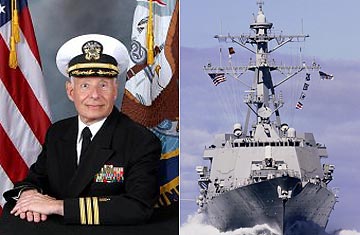
Retired Navy rabbi Maurice "Mo" Kaprow and the U.S.S. Winston S. Churchill
Navy Commander Maurice "Mo" Kaprow was stunned to watch then Commander Holly Graf in action. He saw her for the first time after arriving aboard her ship, the destroyer U.S.S. Winston S. Churchill, in Italy just before the Iraq war began in 2003. A Jewish rabbi and a Navy chaplain, he'd been sent to the Churchill on temporary assignment as the vessel readied for war. Usually pulling out of port is a methodical and precise process. But as Kaprow recalled on Friday, "I never in my life saw such chaos as there was on that bridge — Holly Graf began yelling and screaming rudder orders, engine orders, insulting people. I'd never seen anything like this."
It got even more bizarre as the ship pulled out of Sicily's Augusta harbor. "Just after clearing the breakwater, the ship began to rumble and shake — now she's screaming even louder because nobody knows what's happening," Kaprow said. "I begin to hear young sailors' voices from the fantail, and they're singing, 'Ding-Dong! The Witch Is Dead.' " Kaprow remembered being perplexed by the sudden song. "Then someone came up to me and said, 'We've ran aground. She's finished' " — assuming the accident would mean the end of their commander's career. "They were jumping for joy and singing on the fantail," he said. Actually, one of the ship's props had broken, but the crew's reaction still amazed Kaprow. "I was flabbergasted," he said.
Kaprow left the Navy last month after a 20-year career and visits to some 200 ships. Morale aboard the Churchill, he said, was the worst he ever saw — even on the eve of war with Saddam Hussein, when the Churchill launched Tomahawk missiles from the eastern Mediterranean toward Iraq. "I think the lady is mentally unbalanced," Kaprow said. "I don't believe she ever should have had command."
The Navy removed Graf from command of the guided-missile cruiser U.S.S. Cowpens in January for "cruelty and maltreatment" of her crew. But Kaprow's account makes clear that such conduct also occurred on the first ship Graf commanded. His tale is noteworthy because, unlike most others who witnessed Graf in command, Kaprow was an independent Navy outsider not subject to Graf's orders. Questions continue to swirl about how Graf not only retained her command but kept getting promoted despite reports from eyewitnesses like Kaprow. Graf has declined interview requests, and there has been scant support offered for her by Navy colleagues on naval blogs or elsewhere. An admiral expressed concern on Friday over what he called a "lynch mob" mentality about the case, as even conservative talk-show host Rush Limbaugh weighed in: "This woman sounds like a real Cruella de Vil."
The man known as the "combat rabbi" aboard the Churchill found the environment aboard the ship to be "weird, absolutely weird." Graf would talk to some of her officers but not to others. She would show up at the daily morning intelligence briefing in apparel that Kaprow had never seen on a Navy warship before. "She'd be wearing black slippers," he said, "with one fuzzy ball on each one." Then there were the tirades. "She would argue with the briefers, belittling them," Kaprow said. "Just absolute vile stuff that I had never heard from a C.O. before."
After about 10 days aboard the Churchill, concerned about poor morale on the eve of war, Kaprow visited Graf in her stateroom. "I told her, 'I'm getting some vibes — you're a nice lady and you have a hard job' — I'm telling her some of the junior officers are concerned and are really upset," Kaprow recalled. "I'm giving her the spiel, and she just goes bonkers and cuts me off. She said she didn't want to talk about it."
For the rest of his time aboard, they didn't speak to each other. "I became a pariah, and she just refused to talk to me," Kaprow said. "When she saw me eating in the wardroom, she'd come in and grab her food and run away — she would not talk to me." Kaprow can't explain how Graf continued to rise up the Navy command ladder. "Certain people in the Navy are preselected for command, and no matter what happens, the Navy will make sure that it happens," he said.
After more than a month on Graf's ship, Kaprow left for the carrier U.S.S. Theodore Roosevelt to tell Graf's superior what he had witnessed. He was the second senior officer from the ship to complain to superiors about Graf. "I told all of this to the commodore," Kaprow said, "but I don't know what happened to it from there." Back on the Churchill, officers who knew that Kaprow was meeting with the commodore waited anxiously for a change in the Churchill's command climate. It never came.
